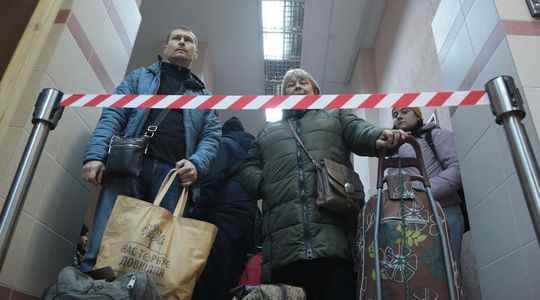“The work organizing the departure of the inhabitants of the right bank of the Dnipro river to safe regions in Russia is completed”, declared, this Thursday evening, October 27, Sergueï Aksionov, the leader of Crimea. Russia is preparing to face an assault by the Ukrainian army and has been evacuating the population since October 19 to the nearest Russian localities. For its part, Ukraine denounces “population deportations”.
- “The bombings will not break us”, says Zelensky
This Thursday, the Ukrainian president declared that the Russian attacks against the electrical installations would not affect the morale of the Ukrainians. Contrary to his habit, Volodymyr Zelensky delivered his daily address outside, near the wreckage of a drone, explaining that the Ukrainian forces had shot down twenty-three in the past two days. “The bombardments will not break us, the idea of hearing the enemy anthem ring out in our country is more frightening than the sound of its rockets. We are not afraid of the night,” he said. According to him, Russia carried out more than 8,000 airstrikes, fired 4,500 missiles and thirty drone attacks in two days.
- Biden worried about Putin’s speech on nuclear weapons
US President Joe Biden has expressed disbelief after statements made by his Russian counterpart, Vladimir Putin, on Thursday that he has no intention of using nuclear weapons in Ukraine. “If he doesn’t intend to, why is he talking so much about it? Why is he talking about Russia’s capabilities to use a tactical nuclear weapon?” Joe Biden said in an interview at NewsNation. “His approach to this issue is very dangerous,” said the American leader.
The White House stressed on Thursday that the American president had “no intention of sitting down with Vladimir Putin”, during the G20 summit which the two leaders are to attend in November in Bali, Indonesia, the door announced. – Executive Spokesman for National Security Issues, John Kirby.
- For Putin, the world is entering a “dangerous decade”
This Thursday, outside the Valdai Discussion Club in Moscow, Vladimir Putin declared that the world was entering “its most dangerous decade” since the Second World War. The first illustration of this change of atmosphere is the conflict in Ukraine, which shows, according to him, that “the West does not have a clear unity and is not able to lead the world”. Accusing Western countries of behaving like “neo-colonialists”, he believes that “Russia is only defending its right to exist”.
Regarding the possibility of using atomic weapons, the Russian president put his past remarks into perspective, believing that he was only responding to the provocations of his opponents. “We never talked about the possibility of using nuclear weapons. We only hinted in response to statements from other countries,” he said.
- The United States will do everything to extend the agreement on the export of Ukrainian cereals
As Ukraine’s grain export deal expires in mid-November, US Secretary of State Antony Blinken said Russia faces “great wrath” if it pulls out of the deal. the agreement.
“We will do everything in our power to maintain the agreement,” Blinken said during a trip to Ottawa. In particular, he argued that a decision by Russia to end this agreement would be greeted “with deep concern” and “a lot of anger by countries around the world that benefit from Ukrainian grain”.
Signed on July 22 under the aegis of the UN, the “Black Sea Agreement” set up, for 120 days, procedures allowing the export of Ukrainian cereals blocked by the war. The Secretary of State also paid tribute to the work of the United Nations in signing this agreement and the beneficial effects it has had across the globe.
- The Russian Parliament authorizes the mobilization of ex-convicts convicted of serious crimes
Russian deputies approved, on Thursday, amendments to the law authorizing mobilization former prisoners who have been convicted of serious crimes. They can now be sent to Ukraine. These include people who were released from prison less than eight years ago for “serious crimes” or less than ten years ago for “particularly serious crimes”.
Until now, the law on mobilization decreed in September by the Russian President, Vladimir Putin, prohibited the recruitment of this type of ex-convict. From now on, only those who have been convicted of pedophilia, hostage-taking or an attack, trafficking in radioactive materials, espionage or high treason cannot be mobilized, according to amendments voted on Thursday by the Duma, the lower house of the Russian Parliament.
